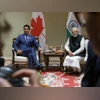India’s diplomatic relations with Canada hit a fresh low on Monday following New Delhi’s decision to withdraw its High Commissioner, Sanjay Kumar Verma, along with other diplomats and officials, from the north American nation and expel six of its diplomats. India said the Canadian government, led by Prime Minister Justin Trudeau, had been targeting its representatives for “vote bank politics”.
In late night development, New Delhi asked the six Canadian diplomats, including Acting High Commissioner Stewart Ross Wheeler, to leave the country by or before 11.59 pm, October 19.
The tensions escalated after Ottawa conveyed to New Delhi its intention to question Indian diplomats and officials as part of its investigation into the killing of Sikh extremist Hardeep Singh Nijjar.
Earlier in the afternoon, in a statement issued by the Ministry of External Affairs (MEA), India revealed it had received a diplomatic communication from Canada on Sunday identifying Verma and other diplomats as “persons of interest” in the Nijjar case. New Delhi firmly rejected these “preposterous imputations”, attributing them to a “political agenda” from the Trudeau government aimed at serving its “narrow political interests”.
The ministry underscored that High Commissioner Verma is a senior diplomat with a distinguished career spanning 36 years, having served in various countries, including Japan, Sudan, Italy, Turkiye, Vietnam, and China. India denounced the “ludicrous” accusations made against him by the Canadian government, calling them deserving of contempt.
By evening, the MEA summoned Canada’s Charge d’Affaires (CDA) in New Delhi, informing him that the “baseless targeting” of Indian diplomats was “completely unacceptable”. India expressed that the actions of the Trudeau government had fostered an environment of extremism and violence, jeopardising the safety of its diplomats. It conveyed a lack of confidence in the current Canadian government’s commitment to their security, warning that India reserves the right to take further measures in response to what it described as the Trudeau government’s “support for extremism, violence and separatism against India”.
More From This Section
Tensions between India and Canada had already heightened after Trudeau alleged last September a “potential” involvement of Indian agents in the killing of Nijjar, a Canadian citizen. Nijjar was shot dead in Surrey, British Columbia, in June 2023 by two masked assailants.
New Delhi then had rejected Trudeau’s allegations as "absurd." In October 2023, Canada withdrew over 40 diplomats from India after New Delhi asked Ottawa to reduce its diplomatic presence. Subsequently, India suspended visa issuance to Canadian nationals.
In its statement, the MEA hit out at the Trudeau government for executing a “deliberate strategy of smearing India”. It cautioned Ottawa about the “activities” of the Canadian High Commission in India “serve the political agenda of the current regime”. New Delhi stated that it has begun to apply the principle of reciprocity regarding diplomatic representation. However, it indicated that in light of Canada's recent “efforts” to fabricate allegations against Indian diplomats, India “now reserves the right to take further steps”, suggesting that the Canadian diplomatic presence in India could face similar treatment.
India asserted that the Canadian government has failed to share “a shred of evidence” to support its claims, despite multiple requests following Trudeau's allegations in September 2023. The MEA’s statement underscored that the latest communication from Canada had once again involved “assertions without any facts”, leading to the conclusion that there is a “deliberate strategy of smearing India for political gains” on the pretext of an investigation.
Trudeau and Indian Prime Minister Narendra Modi met on October 11 during the East Asia Summit in Laos, where India contested Canada's characterisation of their discussions. The Canadian government claimed that the leaders had a “brief exchange”. At a press conference in Laos, Trudeau emphasised his focus on ensuring “the safety of Canadians”, while MEA sources dismissed his claims, asserting there was “no substantive discussion” between him and Modi.
The MEA’s Monday statement pointed to Trudeau's “long-standing hostility” towards India, noting that this sentiment was apparent during his 2018 visit to the country, which was perceived as an attempt to curry favour with a specific voter base. New Delhi highlighted that Trudeau's Cabinet included individuals who have openly endorsed an extremist and separatist agenda concerning India.
Trudeau’s government “was dependent on a political party, whose leader openly espouses a separatist ideology vis-à-vis India”, New Delhi said.
It pointed out that Trudeau's government relies on a political party whose leader advocates for a separatist ideology against India. It said the latest development, of questioning Indian diplomats in the probe, “is no coincidence that it takes place as Prime Minister Trudeau is to depose before a Commission on foreign interference”.
India accused the Trudeau government of continually appeasing violent extremists and terrorists, allowing them to harass, threaten, and intimidate Indian diplomats and community leaders in Canada for narrow political gains. It also highlighted that some individuals who entered Canada illegally have been expedited for citizenship, while multiple extradition requests from India regarding terrorists and organised crime leaders living in Canada have been ignored.
)